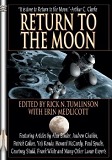PRESS RELEASE: Space Settlement Institute Consulted by Popular Science Magazine
The Space Settlement Institute's expert opinion that Lunar land claims recognition is the incentive needed to create a new era of massive private investment in space development has appeared in the September 2011 issue of Popular Science magazine.
In the article, "Can I Buy Land on the Moon?: Governments can't claim land on the moon, but individuals and corporations may one day be able to" (p.81-82), Alan Wasser of the Institute explains that Lunar land claims recognition would create the necessary financial incentive for private companies to invest heavily in space and Lunar infrastructure leading ultimately to permanent human settlement on the Moon and beyond.
Today a sufficiently large financial incentive is woefully lacking (and it always has been), which explains why nearly 40 years have passed since anyone traveled beyond Earth orbit.
From the Popular Science article:
If the Space Settlement Institute - which lobbies for private industry to develop land on other planets - has its way, new laws will allows space colonists to stake moon claims and start a colony.
Alan Wasser, the Space Settlement Institute's chairman, says that a private company should build a "spaceline," similar to an airline, between the Earth and moon. And because a corporation is not a nation, the [national sovereignty prohibition of the] Outer Space Treaty would not apply....
Wasser says that land ownership - and the promise of profits based on it - is a necessary incentive to invest in space settlement. He is lobbying for legislation that would commit the U.S. government to honor future moon claims.
The legislation proposed by the Institute is the Space Settlement Prize Act, which would "...create, at no cost to taxpayers, a multi-billion dollar incentive for private companies to finance and build permanent settlements on the Moon and/or Mars."
Interestingly, Stephen E. Doyle, another space expert quoted in the Popular Science article, thinks the Antarctic Treaty should be used as a template for lunar development. We strongly disagree. In the opinion of the Space Settlement Institute, it would be a terrible disaster for the future of mankind if the Lunar government were to be modeled after Antarctica.Another Reference in Popular Science
UPDATE: April 2, 2012. Lunar land claims recognition appeared again in Popular Science, in the online article Free-Market Fans Encourage Rush for Off-Planet Real Estate. ![]()
From the latest PopSci article:
...The latest in a drumbeat of pro-colonization comes from the libertarian Competitive Enterprise Institute, which is advocating the recognition of property rights on the moon or other celestial bodies.
Space settlement activist Rand Simberg says in a new white paper that the U.S. should recognize land claims off-planet, which would allow for legal land titles sort of like the former Homestead Act. Moon land titles could be used as collateral for loans, or sold to raise money to develop the lunar landscape, he argues.
"It would have great potential to kick the development of extraterrestrial resources—and perhaps even the human settlement of space—into high gear," Simberg writes.
Other experts have weighed in on this before, noting that corporations have settled new worlds in the past. Recognizing property rights in space would fly in the face of the Moon Treaty, established in 1979, which outlaws private property claims. But the U.S. is not a signatory to that treaty.
It is a signatory to the Outer Space Treaty of 1967, which prevents establishment of colonies on celestial bodies. But Simberg and others, including Alan Wasser, chairman of the Space Settlement Institute, argue that it prevents nations from doing the colonizing — not private corporations.
Like Wasser has, Simberg proposes that the U.S. government recognize off-planet land claims from people who meet three criteria: Plans to establish permanent human settlements on the Moon, Mars, or other bodies; provide commercial transportation between the settlement and Earth; and offer the land for sale.
Simberg plans to present his study on Capitol Hill this week. We know he has at least one high-ranking presumptive supporter in Newt Gingrich...





